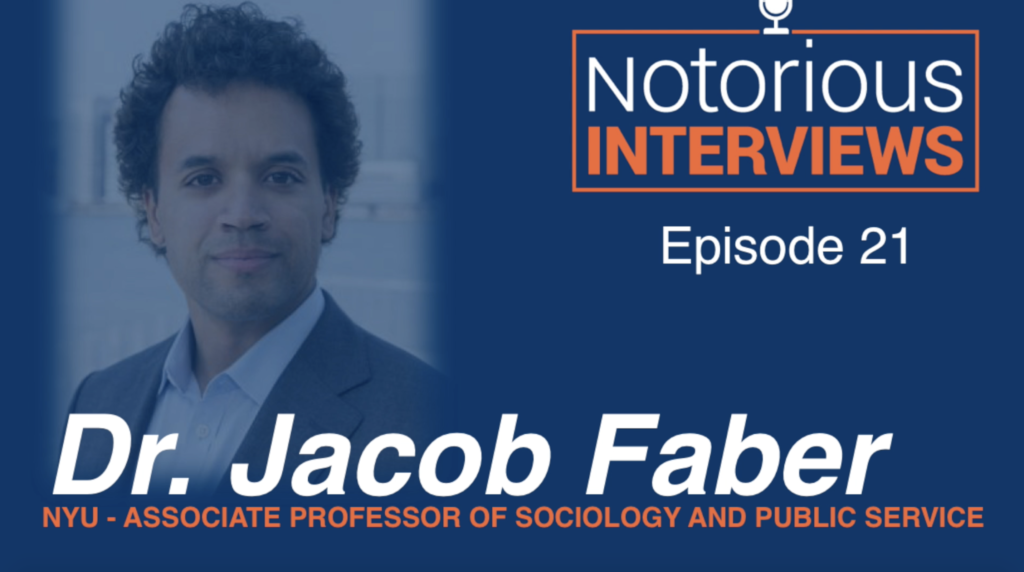In this episode, I speak with a researcher and policy influencer, Dr. Jacob Faber, an Associate Professor of Sociology and Public Service at New York University.
I wanted to talk to him given his research on systemic inequality, race and ethnicity, and housing. He was one of the experts that the New York State Senate called to testify at the virtual hearings around racial discrimination on Long Island. I knew that his research and his views would be influential on the actions that the NY legislature has taken and will take, and thought I would try to bring his views directly to all of you.
We discuss housing legislation, his research, and the problems that racial minorities face in the current housing market. We also get into root causes, and his thoughts on possible solutions.
I would say enjoy the show, but the topic is a bit gloomy… so I’ll go with be educated with what is fairly mainstream opinion amongst researchers and academics.
Thank you!
-rsh
Conversation w/ Dr. Jacob Faber
Podcast Only:
Video:
Official Bio: (From jacobfaber.com)
Jacob William Faber is an Associate Professor of Sociology and Public Service in New York University’s Robert F. Wagner School of Public Service and holds a joint appointment in NYU’s Sociology Department. His research and teaching focuses on spatial inequality. He leverages observational and experimental methods to study the mechanisms responsible for sorting individuals across space and how the distributions of people by race and class interact with political, social, and ecological systems to create and sustain economic disparities. While there is a rich literature exploring the geography of opportunity, there remain many unsettled questions about the causes of segregation and its effects on the residents of urban ghettos, wealthy suburbs, and the diverse set of places in between.
His scholarship highlights the rapidly-changing roles of numerous institutional actors (e.g. mortgage lenders, real estate agents, check cashing outlets, and police officers) in facilitating the reproduction of racial and spatial inequality. Through investigation of several aspects of American life, he demonstrates that a pattern of “institutional marginalization” emerges as a powerful mechanism connecting segregation to socioeconomic disadvantage. His work has been published in American Sociological Review, Annual Review of Sociology, Proceedings of the National Academy of Sciences, Demography, Social Forces, Housing Policy Debate, and other prominent journals.
Professor Faber’s scholarship has received recognition from several organizations, including the ASA Latino/Latina Sociology Section, Association for Public Policy Analysis & Management (APPAM), Association of Black Sociologists (ABS), Integrated Public Use Microdata Series (IPUMS), and Society for the Advancement of Socio-Economics (SASE). In 2020, Professor Faber won NYU’s Making a Difference Award for his research and teaching on the hidden and unsettled causes of segregation by race. In 2018, he was named NYU Wagner’s Professor of the Year and won the Equity, Diversity, and Inclusion Research Prize.
Dr. Faber earned his PhD in Sociology from New York University and worked as a Postdoctoral Research Associate in the Department of Sociology at Princeton University. He also graduated from the Massachusetts Institute of Technology with Master’s degrees in Telecommunications Policy and Urban Studies and Planning and a Bachelor’s degree in Management Science. Between stints at graduate school, Dr. Faber worked as a Senior Researcher for the Center for Social Inclusion, a racial justice policy advocacy organization.



1 thought on “The Notorious Interview: Episode 21 – Dr. Jacob Faber, NYU”
Rob, If you are going to make an intro at least say what exactly you disagreed with (this was a 44 min. interview). Your intro was vague.
As I listened to the interview this statement stood-out at the 10.4 min. mark.
“The ways the segregation and racial bias can create financial incentives for people in the housing industry to profit from and encourage segregation”.
And here is why this statement stood out to me. Earlier today I read this article and watched the presentation put on by RESO:
click here: https://www.reso.org/reso-data-broker-location/
Isn’t big tech using data to profit? Isn’t big tech using data to redline? I encourage everyone to watch the presentation. At 25 min.-ish mark of https://www.reso.org/reso-data-broker-location/ the presenter talks about commissions and buyer agent compensation.
And then of course there is this:
“Said Stegemann, ‘If I know how many people came through the property, I can better value my listings. I can better say listings in 12345 ZIP code get lots of showings, lots of people see my sign. And I have a 32% chance of my brokerage double-ending that deal if we get that sign in that particular ZIP code because of how well traffic is in the areas or how high in demand that is.'”
What? “double-ending?” WTF. Isn’t this exactly what your guest Jacob William Faber is referring to? Financial incentives for people in the housing industry. If I’m on the wrong track, please someone set me straight. Because from my view, RESO isn’t interested in “standards”. It’s interested in big tech+ data for money.
Here is another quote from the article about RESO:
“delved into how MLSs can use RESO-standardized data fields to help brokerages make better decisions, like choosing office locations, by passing through more data to brokers and their vendors.”
Maybe it’s time to look into RESO’s board and “mission” as a non-profit and how they work with NAR.
Your (Rob) question: “How do we solve racism?”
Maybe it’s time for agents to be W-2s (as you, Rob, have wrote about before). This is a 1099 problem as Uber is dealing with too:
https://www.bloomberg.com/news/articles/2019-12-11/the-discrimination-risk-in-uber-s-new-driver-rule
In ending, here are my choice song lyrics:
“Some of us that work forces
Are the same that burn crosses…”
-TP
Comments are closed.